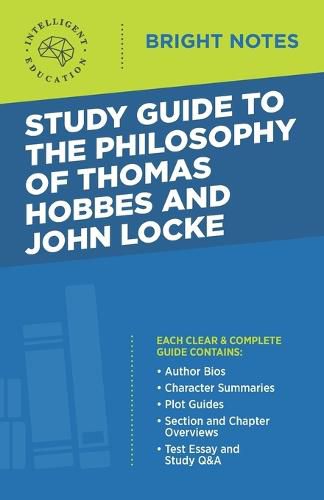Readings Newsletter
Become a Readings Member to make your shopping experience even easier.
Sign in or sign up for free!
You’re not far away from qualifying for FREE standard shipping within Australia
You’ve qualified for FREE standard shipping within Australia
The cart is loading…






This title is printed to order. This book may have been self-published. If so, we cannot guarantee the quality of the content. In the main most books will have gone through the editing process however some may not. We therefore suggest that you be aware of this before ordering this book. If in doubt check either the author or publisher’s details as we are unable to accept any returns unless they are faulty. Please contact us if you have any questions.
A comprehensive study guide offering in-depth explanation, essay, and test prep for Thomas Hobbes’ Leviathan and John Locke’s Two Treatises of Government. These two English philosophers are recognized for being some of the most influential of Enlightenment thinkers. As two of the most prominent philosophers of the seventeenth century, Hobbes and Locke illustrated opposing and rebellious views on the ideal form of government and sovereignty, that included religion and empiricism. Moreover, these works have paved the way for modern theories such as the formulation of social contract theory and liberalism. This Bright Notes Study Guide includes notes and commentary on the literary classics Leviathan and Two Treatises of Government, helping students to thoroughly explore the reasons these works have stood the literary test of time. Each Bright Notes Study Guide contains: - Introductions to the Author and the Work - Character Summaries - Plot Guides - Section and Chapter Overviews - Test Essay and Study Q&As The Bright Notes Study Guide series offers an in-depth tour of more than 275 classic works of literature, exploring characters, critical commentary, historical background, plots, and themes. This set of study guides encourages readers to dig deeper in their understanding by including essay questions and answers as well as topics for further research.
$9.00 standard shipping within Australia
FREE standard shipping within Australia for orders over $100.00
Express & International shipping calculated at checkout
This title is printed to order. This book may have been self-published. If so, we cannot guarantee the quality of the content. In the main most books will have gone through the editing process however some may not. We therefore suggest that you be aware of this before ordering this book. If in doubt check either the author or publisher’s details as we are unable to accept any returns unless they are faulty. Please contact us if you have any questions.
A comprehensive study guide offering in-depth explanation, essay, and test prep for Thomas Hobbes’ Leviathan and John Locke’s Two Treatises of Government. These two English philosophers are recognized for being some of the most influential of Enlightenment thinkers. As two of the most prominent philosophers of the seventeenth century, Hobbes and Locke illustrated opposing and rebellious views on the ideal form of government and sovereignty, that included religion and empiricism. Moreover, these works have paved the way for modern theories such as the formulation of social contract theory and liberalism. This Bright Notes Study Guide includes notes and commentary on the literary classics Leviathan and Two Treatises of Government, helping students to thoroughly explore the reasons these works have stood the literary test of time. Each Bright Notes Study Guide contains: - Introductions to the Author and the Work - Character Summaries - Plot Guides - Section and Chapter Overviews - Test Essay and Study Q&As The Bright Notes Study Guide series offers an in-depth tour of more than 275 classic works of literature, exploring characters, critical commentary, historical background, plots, and themes. This set of study guides encourages readers to dig deeper in their understanding by including essay questions and answers as well as topics for further research.